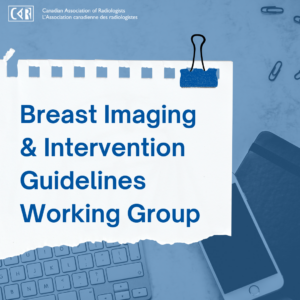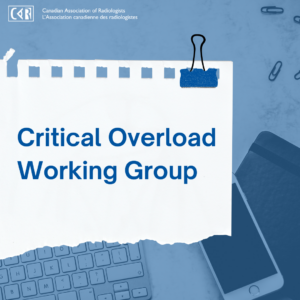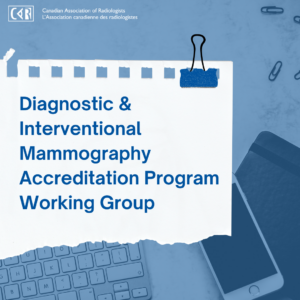Attention Specialists in Breast Imaging, Interventional Radiology, AI, and Data Sharing:
The CAR is introducing five new working groups and one new standing committee that are looking for volunteers. These groups will focus on setting quality guidance and accreditation standards for breast imaging, interventional radiology, data sharing, and integrating AI. This is your opportunity to connect with your peers and lead the development of radiology standards in Canada.

Artificial Intelligence (AI) Standing Committee
The AI Standing Committee is focused on advancing the integration of AI in medical imaging. We are particularly interested in individuals with technical expertise with AI Development, Natural Language Processing, ChatGPT and LLM Applications. This is an exceptional opportunity for those who are passionate about leveraging AI to enhance medical imaging, drive innovation, and improve patient care in radiology.

Breast Imaging and Intervention Guidelines Working Group
The Breast Imaging and Intervention Guidelines Working Group will play a crucial role in updating the 2016 CAR Breast Imaging and Intervention Guidelines, ensuring they align with the latest scientific literature and practices. This initiative aims to provide Canadian practitioners with updated, evidence-based clinical practice guidelines. This is an exciting opportunity to develop guidelines for performing and interpreting breast imaging, as well as performing breast interventional procedures.

Breast MRI and Sonography Standards Working Group
The Breast MRI and Sonography Standards Working Group's mission is to develop robust standards for MRI and Sonography practices. This group will be instrumental in shaping either integrated or stand-alone accreditation programs, based on thorough assessments upon completion of the work. Members will review, suggest improvements, and create technical standards grounded in peer-reviewed evidence and existing national and international standards. Furthermore, the group will develop a comprehensive framework for quality assessment at various stages of the accreditation process and establish criteria for the program’s governance structure. This is an opportunity to contribute to setting high standards in breast MRI and sonography practices on a national scale.

Critical Overload Working Group
The Critical Overload Working Group is focused on developing guidelines for managing critical overload situations in medical imaging departments. Standardized protocols and best practices will be developed to ensure efficient and effective patient prioritization and resource allocation during periods of heightened demand, system failures, or exceptional circumstances. The guidance will aim to facilitate a systematic and equitable approach to patient care while maintaining operational integrity and staff well-being under challenging conditions. The group will work collaboratively to provide guidance for effectively managing these high-demand scenarios in medical imaging settings.

Data Sharing Working Group
The Data Sharing Working Group is a specialized working group tasked with creating a white paper entitled Enhancing Radiology Practice through Data Sharing. This initiative aims to explore and improve the current state of data sharing in medical imaging, address the challenges, and shape future practices. As a member of the working group, you will analyze existing data sharing protocols, identify barriers, contribute to innovative solutions, and collaboratively develop this important document. The working group will commence in January 2024, with the target completion date of June 2024. This is a fantastic professional opportunity if you are passionate about advancing your field through better data sharing practices.

Diagnostic and Interventional Mammography Accreditation Program Working Group
The Diagnostic and Interventional Mammography Accreditation Program Working Group's vital role is to establish accreditation standards that elevate the quality of care in diagnostic breast imaging programs. By leveraging expert consensus, reviewing data, and referencing peer-reviewed evidence, this working group will lay the foundation for a national accreditation program which aims to unify quality processes and enhance patient outcomes in diagnostic interventional breast imaging. Responsibilities include reviewing existing standards, formulating evidence-based suggestions, developing technical standards, and creating a framework for quality assessment and governance in the accreditation process. This is a significant opportunity to influence and shape national standards in diagnostic and interventional mammography.
